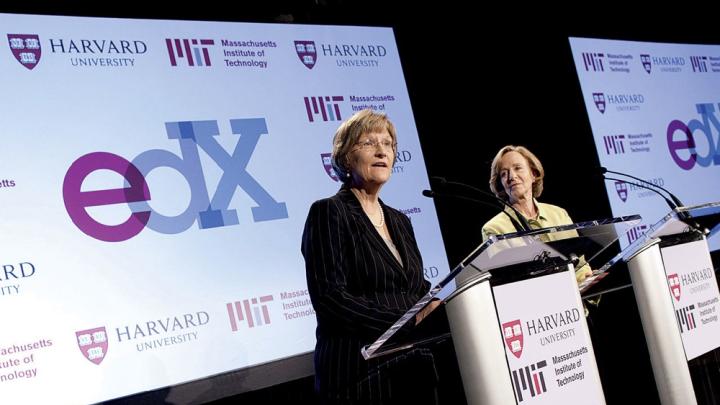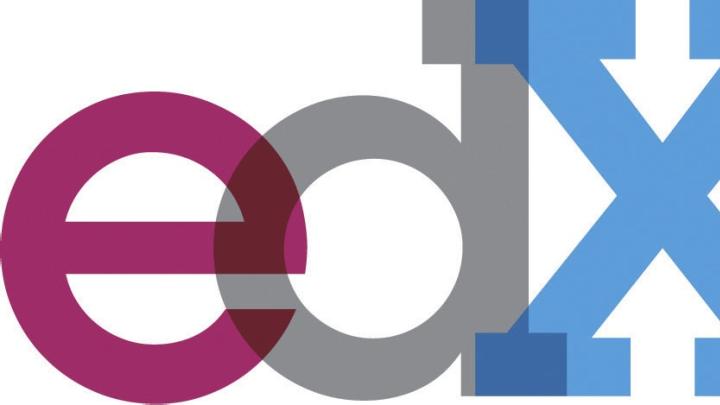With edX, their new, nonprofit joint venture, Harvard and MIT will offer online courses to the general public while investigating technologies for improving distance learning and campus-based education. Presidents Drew Faust and Susan Hockfield unveiled the initiative on May 2, attracting broad news coverage reflecting heightened interest in online education and the scale of the Cambridge institutions’ ambitions. Harvard and MIT officials say edX makes it possible to address evolving education technologies more quickly, and with a broader research agenda, than either institution could alone. From Harvard’s perspective, using the MITx online course platform (which has 120,000 participants enrolled in its first course, 6.002x, “Circuits and Electronics”) markedly accelerates the University’s entry into large-scale distance learning.
Highlights of the edX venture include:
- A Cambridge-based nonprofit organization, owned and governed equally by Harvard and MIT; each is committing $30 million in institutional funds, grants, and philanthropic gifts to capitalize the venture.
- The MITx technology, initially designed to offer noncredit, online versions of MIT courses (incorporating video lessons, embedded quizzes, immediate feedback on student work, online laboratories, and student-paced learning); this platform will be “open-source” software, enabling other institutions to contribute to its development and to add features.
- Harvardx and MITx noncredit courses offered by each institution, beginning in the fall of 2012—with similar identification offered to other institutions that join the venture under the edX parent.
- “Certificates of mastery” for motivated students who wish to demonstrate their knowledge of course content.
Hockfield called edX “a unique opportunity to improve education on our own campuses through online learning, while simultaneously creating a bold new educational path for millions of learners worldwide.” Faust focused on the “unprecedented opportunity to dramatically extend our collective reach by conducting groundbreaking research into effective education and by extending online access to higher quality education…in a way that benefits our students, our peers, and people across the nation and the globe.”
But the collaboration also addresses pressures from peers. Coursera, a venture-capital-funded entity, hosts courses from Michigan, Penn, Princeton, Stanford, and Berkeley (now emphasizing computer science and technology, but looking to add the social sciences, business, and the humanities); and Udacity, spun out by Stanford scholars who taught an artificial-intelligence course last year—with 160,000 matriculants—is building a roster of computer-science courses.
In a briefing, Anant Agarwal, director of MIT’s computer science and artificial intelligence laboratory—who led development of the MITx system, and will serve as edX president—said Internet and mobile technologies had made possible online courses serving massive, diverse, distant student bodies—including applications such as “laboratories” where learners can build circuits as if assembling components like virtual Legos. Assessments (quizzes and grading) for straightforward, technical questions have become widespread, he said. The need to create more complex forms of assessment (open-ended questions requiring paragraph or essay answers) pointed to one of the basic rationales for edX: to foster research on learning, teaching, and evaluation, online and in the classroom.
At the same session, Michael D. Smith, the computer scientist who is dean of the Faculty of Arts and Sciences (FAS), placed edX in the context of the Harvard Initiative on Learning and Teaching, announced last October; expanding interest among FAS professors in rethinking teaching and classrooms, in part by experimenting with technology; extensive online offerings in Harvard’s professional schools; and the sheer pace of change in such technologies. Research, Smith said, is a “big part of what we will be doing”—determining how education will occur in the future, online and on campus. Both institutions are driven by their interest in using new technology “to strengthen, enrich, and augment the residential, campus model,” said MIT provost L. Rafael Reif, who oversaw development of MITx. Reif, who was named Hockfield’s successor as MIT’s president on May 16, called the technology “a living platform,” both delivering courses and driving extensive research on “how learners learn online.”
Online courses and tools, said Harvard provost Alan Garber, who oversees the University’s engagement with edX, offer “measurement capabilities that we’ve never had before.” Educators can see how a student engages with a video, rewinds it, takes a test, and so on. With a large student population in the circuits course and online testing protocols, Reif said, MIT was already administering different versions of tests—making it possible to derive statistically significant data on, say, how well students mastered material and how accurately tests captured that learning.
Garber characterized as “a deep question” how such experiments might in turn inform and improve campus-based classes. Faculty groups at Harvard, he said, are working to determine how to measure learning and teaching effectiveness; the right criteria and tools will be determined by faculty members themselves. Similarly, Reif said, broader course offerings through edX would help faculty members determine what elements of online learning and technology work best in what disciplines, with what applications—if any—in residential education.
Such research is already under way at the Hewlett Foundation-funded Open Learning Inititive at Carnegie Mellon University, among other venues. The Harvard-MIT commitment to the field suggests broader, and accelerating, interest throughout higher education.
The joint venture took shape in discussions during the past several months, according to Garber. The deal itself may have come together rather quickly: when it was announced, a Harvard faculty advisory council apparently had yet to be formed. In a note to faculty colleagues, Smith, who will take the leading role in working with them to develop and deliver courses, indicated that FAS courses in computer science and quantitative social-science methods—both with online elements already in use—and perhaps history or world cultures would be offered this fall. But the details and mechanics for each remained to be settled.
Heretofore, Harvard has been relatively cautious in its online offerings. Harvard@Home, begun in 2001, offered versions of lectures, occasional courses, and coverage of major University events, but was largely felled by cost pressures and the evolution toward cheaper, shorter videos. A test case of a full course, based on Bass professor of government Michael J. Sandel’s popular “Justice” (a large undergraduate Core and General Education class), proved popular worldwide when released in video form in 2007, but was expensive to produce and distribute. The Extension School, with more than 150 tuition-based online classes, spanning disciplines, is probably the University’s most extensive repository of distance-education teaching and learning. Certain professional-school courses are also available online.
During the height of the dot-com bubble at the turn of the century, several universities experimented with fee-based online courses, among them AllLearn (a partnership among Oxford, Yale, and Stanford, chartered in 2001, that closed for financial reasons in 2006)—and Fathom (also defunct, which involved Columbia, the London School of Economics, the universities of Chicago and Michigan, and several leading libraries and museums). Harvard joined neither.
Today, the foundation-funded Open Yale Courses provides 42 full introductory liberal-arts courses online for free; and that institution in May introduced nine faculty-taught summer-session courses online (each worth one Yale College course credit). A few days later, Washington University’s law school launched an online master’s degree in U.S. law aimed at overseas practitioners. MIT’s OpenCourseWare has logged 100 million users who have accessed materials from 2,000 courses in the past decade.
But the defining moment in the current online outreach was the Stanford-originated “Introduction to Artificial Intelligence.” It became a worldwide sensation last year—the model “massive online open course,” or MOOC, as these experiments are now known. Following that proof of concept, a for-profit enterprise, Udacity, Inc., aims to make such courses a regular enterprise; it offers six courses at present.
MITx, unveiled in December to experiment with courses designed specifically for online instruction, embedded that kind of approach in a major research institution. With the foundation of edX, MIT and Harvard are now joining forces in nonprofit, experimental online education on an unprecedented scale.
MITx courses under the edX umbrella are free for any student; there is a fee for certificates of mastery. Reif said MIT faculty members can voluntarily develop such online courses as part of their regular employment; he was not prepared to address how issues of course ownership might evolve. Garber said Harvard’s position mirrored MIT’s: edX and the technology platform are available for faculty members’ voluntary participation. (In past discussions of online education, faculty members have asserted their ownership of course materials they develop for their Harvard teaching.) He said he expected that Harvardx would include free courses, but the professional schools, which offer fee-based online courses, may also use the platform to distribute those if they wish to do so. Dean Smith indicated that the Extension School, which offers its online courses on a tuition basis, will continue to do so; in the future, if it wishes to migrate to the EdX platform, it may do so.
Smith said that although the May announcement signaled just the beginning of a potentially major enterprise, it was “incredibly important” for the University’s educational mission. Advancing educational objectives, he and Garber said, now depends on encouraging faculty members’ interest and involving them in edX’s evolution.








